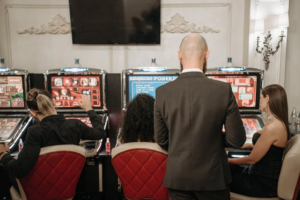Are you ready to roll the dice and take a chance? Gambling can be an exhilarating pastime, offering moments of excitement and anticipation. But what happens when this harmless fun spirals into something more sinister? In today’s blog post, we delve into the world of excessive gambling and explore how easily it can consume our lives.
Join us as we uncover the red flags that signify addiction, helping you recognize when your favorite activity has transformed into a dangerous obsession. It’s time to shine a light on this pressing issue – so let’s get started.
Obsession With Gambling

An obsession with gambling is another sign that you may be engaging in excessive behavior. If thoughts of gambling occupy a significant portion of your day, to the point where it affects your concentration on work, relationships, or other responsibilities, it could be an indication of a problematic gambling habit. For example, always thinking of online slots or constantly looking for opportunities to gamble, such as checking the lottery numbers or visiting gambling websites, can be signs of an obsession. Recognizing and addressing this preoccupation is crucial for maintaining a healthy balance in your life.
Financial Strain
One of the most evident signs that you might be gambling too much is experiencing financial strain. If you find yourself consistently spending more money on gambling than you can afford to lose, it’s time to reassess your habits. Financial difficulties, such as struggling to pay bills or accumulating debt, are clear indicators that your gambling activities may be negatively impacting your overall financial well-being.
Chasing Losses
 Chasing losses is a behavior commonly associated with problem gambling. If you find yourself consistently trying to recoup the money you’ve lost by placing more bets, you may be caught in an unhealthy pattern. Chasing losses rarely leads to positive outcomes and can contribute to further financial and emotional distress. Acknowledging this behavior and taking steps to break the cycle is essential for responsible gambling.
Chasing losses is a behavior commonly associated with problem gambling. If you find yourself consistently trying to recoup the money you’ve lost by placing more bets, you may be caught in an unhealthy pattern. Chasing losses rarely leads to positive outcomes and can contribute to further financial and emotional distress. Acknowledging this behavior and taking steps to break the cycle is essential for responsible gambling.
Neglecting Responsibilities
Excessive gambling can lead to neglecting important responsibilities in your life. If you notice a decline in your performance at work, strained relationships with family and friends, or a lack of attention to daily obligations, it may be a sign that gambling is taking precedence over other essential aspects of your life. Responsible gaming involves maintaining a healthy balance between recreational activities and your overall well-being.
Inability to Stop
Losing control over your ability to stop gambling is a significant red flag. If you find it challenging to set limits on your gambling activities or consistently exceed the limits you’ve set for yourself, it may indicate a loss of control. Recognizing this lack of control is crucial for implementing effective strategies to curb excessive gambling and regain a sense of autonomy over your gaming habits.
Emotional Distress

Using gambling as a coping mechanism for emotional distress is a clear sign that it may be playing too large a role in your life. If you turn to gambling to escape feelings of stress, anxiety, or depression, it can lead to a detrimental cycle where gambling becomes a default response to emotional challenges. Seeking healthier alternatives for managing emotions, such as talking to a friend or seeking professional support, is essential for responsible gaming.
Recognizing the signs of excessive gambling is a crucial step toward fostering responsible gaming habits. If you identify with any of the signs mentioned above, it’s essential to take proactive measures to address and rectify the situation.


